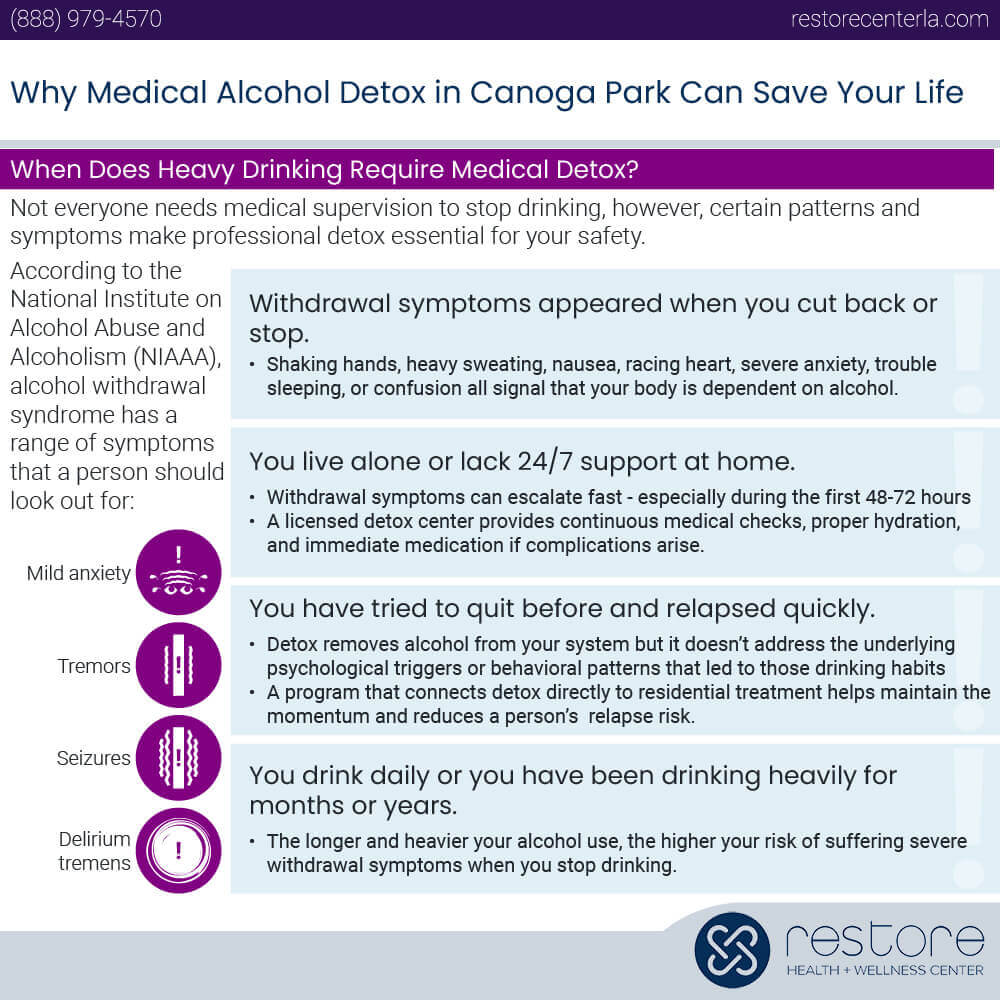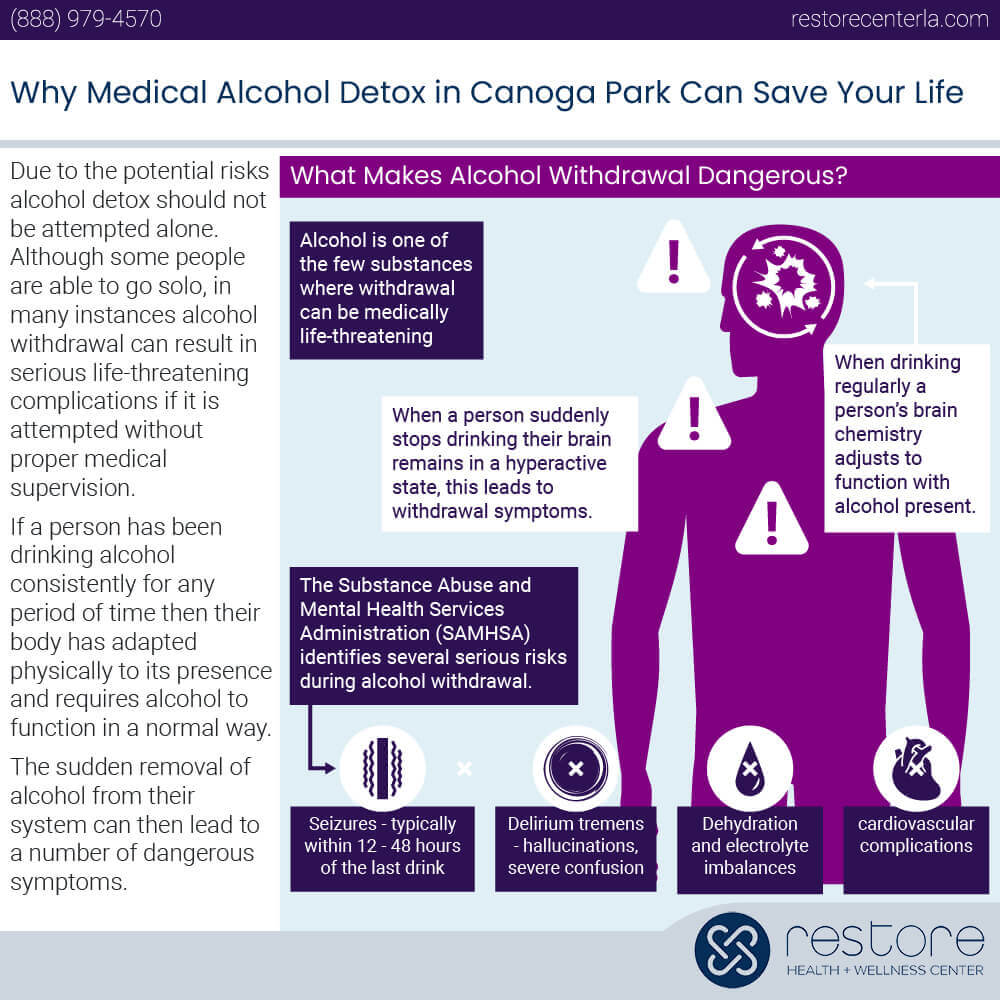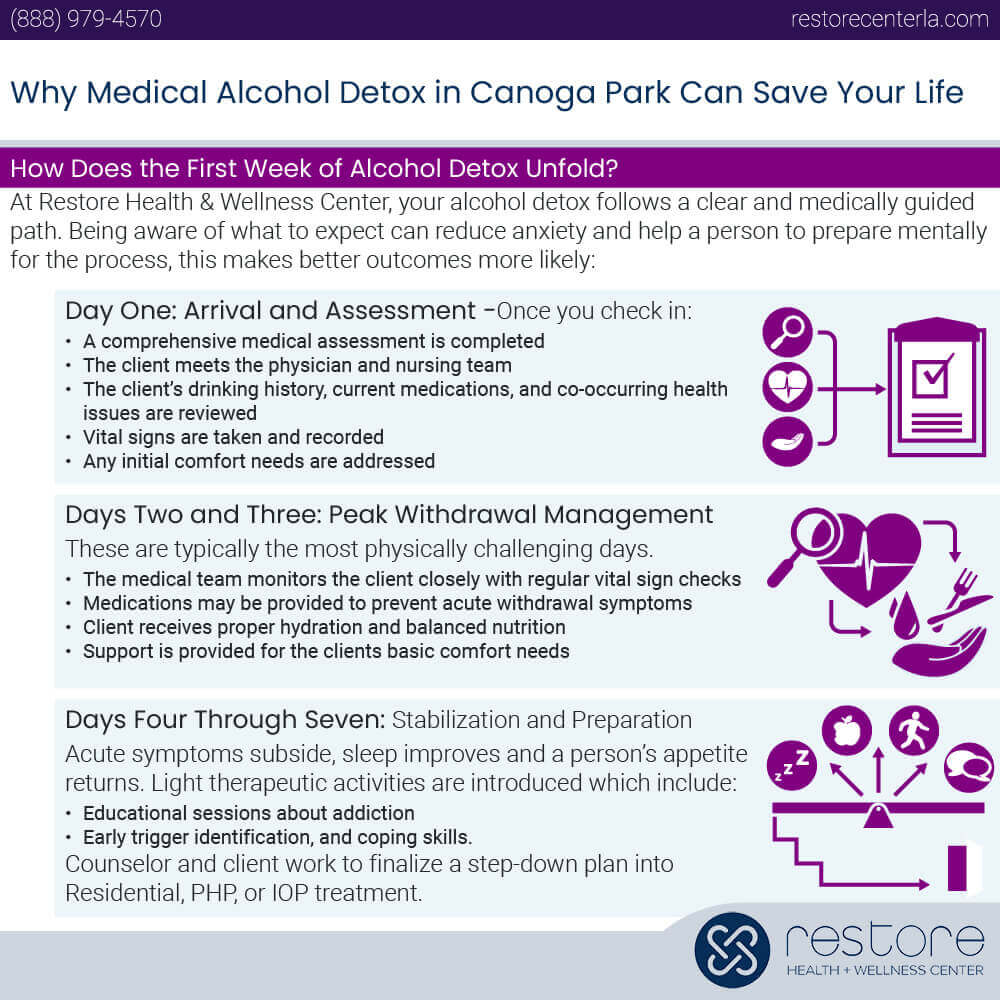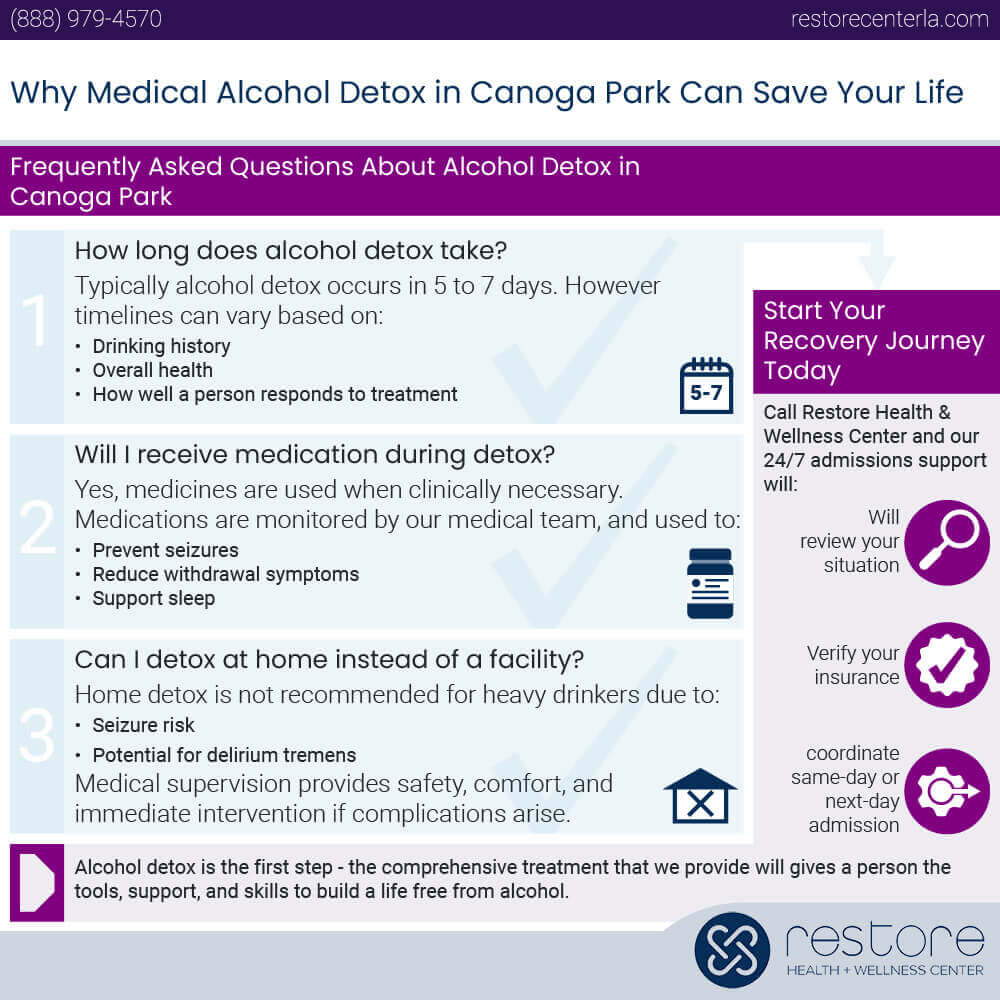Alcohol withdrawal is not something you should face alone. While some people believe they can stop drinking through willpower, the reality is that alcohol withdrawal can produce life-threatening complications without proper medical care. If you have been drinking heavily for weeks, months, or years, your body has physically adapted to alcohol’s presence, and suddenly removing it can trigger dangerous symptoms.
At Restore Health & Wellness Center in Canoga Park, we provide medical alcohol detox in a Joint Commission accredited facility with round-the-clock clinical support. Our program offers immediate admissions, rapid insurance verification, and a complete continuum of care that moves you from detox to residential treatment, PHP, or IOP without gaps or delays.
When Does Heavy Drinking Require Medical Detox?

Not everyone who drinks needs medical supervision to stop, but certain patterns and symptoms make professional detox essential for your safety. According to the National Institute on Alcohol Abuse and Alcoholism (NIAAA), alcohol withdrawal syndrome can range from mild anxiety and tremors to severe complications like seizures and delirium tremens, which can be fatal without treatment.
You need medical alcohol detox in Canoga Park if you recognize any of these warning signs:
Withdrawal symptoms appeared when you tried to cut back or stop. Shaking hands, heavy sweating, nausea, racing heart, severe anxiety, trouble sleeping, or confusion all signal that your body is dependent on alcohol.
You live alone or lack 24/7 support at home. Withdrawal symptoms can escalate quickly, especially during the first 48 to 72 hours. A licensed detox center provides continuous medical checks, proper hydration and nutrition, and immediate medication if complications arise.
You have tried to quit before and relapsed quickly. Detox alone does not address the psychological triggers and behavioral patterns that drive drinking. A program that connects detox directly to residential treatment keeps your momentum going and reduces relapse risk.
You drink daily or have been drinking heavily for months or years. The longer and heavier your alcohol use, the higher your risk for severe withdrawal.
What Makes Alcohol Withdrawal Dangerous?

Alcohol is one of the few substances where withdrawal can be medically life-threatening. When you drink regularly, your brain chemistry adjusts to function with alcohol present. When you suddenly stop drinking, your brain remains in a hyperactive state, which causes withdrawal symptoms.
The Substance Abuse and Mental Health Services Administration (SAMHSA) identifies several serious risks during alcohol withdrawal, including seizures that typically occur 12 to 48 hours after your last drink, delirium tremens featuring severe confusion and hallucinations, dehydration and electrolyte imbalances, and cardiovascular complications. Medical care with trained staff and appropriate medications significantly reduces these risks.
How Does the First Week of Alcohol Detox Unfold?

Understanding what happens during detox can reduce anxiety and help you prepare mentally for the process. At Restore Health & Wellness Center, your alcohol detox follows a clear, medically guided path:
Day One: Arrival and Assessment
You check in, complete a comprehensive medical assessment, and meet with the physician and nursing team. We review your drinking history, current medications, and co-occurring health issues. Your vital signs are recorded, and your initial comfort needs are addressed.
Days Two and Three: Peak Withdrawal Management
These are typically the most physically challenging days. Our medical team monitors you closely with regular vital sign checks. Medications may be provided to prevent seizures, reduce anxiety, support sleep, and manage other symptoms. You receive proper hydration, balanced nutrition, and support for basic comfort needs.
Days Four Through Seven: Stabilization and Preparation
As acute symptoms subside, you begin to sleep better and regain your appetite. Light therapeutic activities are introduced, including educational sessions about addiction, early trigger identification, and coping skills. Your counselor works with you to finalize your step-down plan into residential, PHP, or IOP treatment.
Why Does Environment Matter During Alcohol Detox?

Research from the National Institute on Drug Abuse (NIDA) shows that the physical environment during detox directly impacts outcomes. Restore’s Canoga Park campus provides a calm, residential setting designed to lower stress and support healing. You can sleep without interruptions, eat nutritious meals, and participate in care without the triggers and pressures that exist at home.
What Comes After Detox Ends?
Completing detox is an important achievement, but it is not the end of treatment. Detox addresses physical dependence, but it does not change the thoughts, habits, and emotional patterns that drive drinking.
Most clients at Restore step directly into our residential addiction treatment program on the same Canoga Park campus. This provides 24-hour structure, daily individual and group therapy, and skill-building activities in a safe, sober environment.
Other clients transition to a Partial Hospitalization Program (PHP), which offers full-day therapy five to seven days per week without requiring an overnight stay. For those balancing work or family commitments, Intensive Outpatient Programs (IOP) provide focused therapy several days per week while allowing you to maintain employment and home life.
How Does Dual Diagnosis Care Work?
Many individuals who struggle with alcohol addiction also experience mental health conditions like anxiety, depression, or trauma. SAMHSA research indicates that nearly 40% of people with alcohol use disorder have a co-occurring mental health diagnosis.
At Restore, we screen for mental health concerns during your detox intake. If anxiety, depression, PTSD, or other conditions are identified, your treatment plan addresses both issues simultaneously through dual-diagnosis care. This integrated approach combines evidence-based therapy, behavioral strategies, and medication management when appropriate.
Frequently Asked Questions About Alcohol Detox in Canoga Park

How long does alcohol detox take?
Most people complete alcohol detox in 5 to 7 days, but timelines vary based on drinking history, overall health, and how your body responds to treatment. Your medical team monitors your progress and adjusts care as needed.
Will I receive medication during detox?
Yes, medications are used when clinically necessary to prevent seizures, reduce withdrawal symptoms, support sleep, and keep you safe. All medications are prescribed and monitored by our medical team.
Can I detox at home instead of a facility?
Home detox is not recommended for heavy drinkers due to seizure risk and the potential for delirium tremens. Medical supervision provides safety, comfort, and immediate intervention if complications arise.
Start Your Recovery Journey Today
If you have been searching for safe, medically supervised alcohol detox in Canoga Park, do not wait another day. Call Restore Health & Wellness Center now at (888) 979-4570 for 24/7 admissions support. Our team will review your situation, verify your insurance, and coordinate same-day or next-day admission when appropriate.
Alcohol detox is the first step. The comprehensive treatment that follows gives you the tools, support, and skills to build a life free from alcohol.
Call now for immediate support, or verify your insurance online to begin safe alcohol detox in Canoga Park with seamless access to residential, PHP, and IOP treatment programs.
References:
- National Institute on Alcohol Abuse and Alcoholism (NIAAA). (2024). Treatment for Alcohol Problems: Finding and Getting Help. https://www.niaaa.nih.gov
- Substance Abuse and Mental Health Services Administration (SAMHSA). (2023). Detoxification and Substance Abuse Treatment. https://www.samhsa.gov
- National Institute on Drug Abuse (NIDA). (2024). Principles of Drug Addiction Treatment: A Research-Based Guide. https://www.drugabuse.gov

